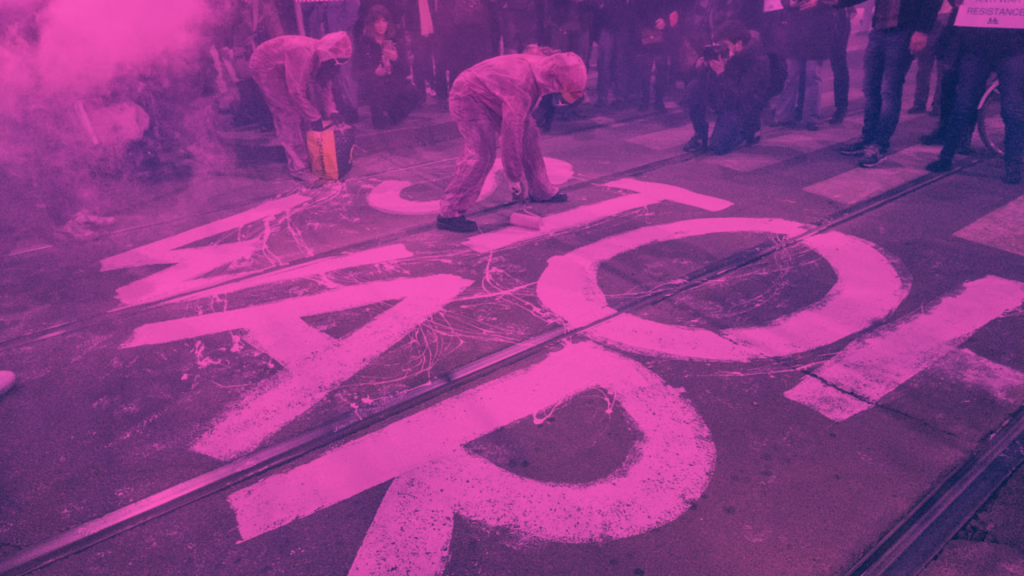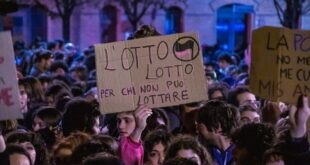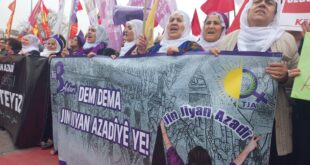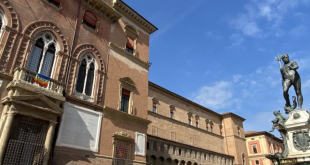By Women’s assembly of Migrants Coordination
The war in Ukraine is a patriarchal war: this is why opposing the war is our priority. During the feminist and transfeminist strike called by Non Una di Meno on March 8, we said it out loud. As women, workers, and migrants we choose peace and therefore we choose to fight against the patriarchal and racist violence that this war is exacerbating. To do so, we must break the fronts the war tries to impose on us through violence and weapons, government policies, and military lexicon. We refuse to take sides for one state or another, for one national flag or another, or for one world power or another. For us, being feminist means standing without hesitation on all fronts against those who wage war to impose domination, oppression and exploitation; it means standing on the side of those who fight against oppression, who choose to migrate in order not to suffer, and who stay to defend what they have.

The war in Ukraine is a patriarchal war because it conveys a clear message – that it is not possible to rise up against authority. This is the same message that every act of male violence communicates to those women who do not submit and who must therefore be punished. Putin wants to impose through war his authority on a population that does not want to accept it. However, we know that the authority that relies on violence is fragile. Our stance against the war draws its strength from the transnational feminist and transfeminist strike that has challenged patriarchal violence everywhere in the world. The violence of patriarchal war must be opposed by our collective and transnational strength. This is the politics that millions of women and lgbtqia+ people affirmed on March 8.
The war in Ukraine is a patriarchal war because it is reaffirming through bombings those hierarchies we are challenging. Men must be soldiers and prove by fighting their truly patriotic maleness. By contrast, women are conceived as weak and powerless objects of protection. Until before the war broke out, the European Union – which ties residence permits to work or family, forcing us to accept poor wages or violent husbands – built barriers on its borders to prevent migrants’ entrance. Now, it presents itself as a benevolent democratic patriarch who will protect women fleeing war – as long as they have white skin. We know that Ukrainian women are not just victims to be protected; we know they are not merely mothers, wives, and daughters doomed to preserve the unity of their homeland and nation. We know that despite and beyond the war, Ukrainian women live, work, and fight not to be oppressed and to gain their autonomy. We also know that not all men want to be soldiers: many remain in Ukraine because of martial law; together with many women, other men resist the invasion to defend their freedom of choice, while others refuse to fight any war and try to escape; finally, some people are prevented from fleeing because their documents define them as men although they do not identify as such. For us, being feminists and fighting for peace means rejecting the structures, roles and hierarchies based on gender and skin colour that war and the racist state policies seek to impose.
The war in Ukraine is a patriarchal war because its violence enforces the sexual division of labour. The majority of refugees arriving from Ukraine are women. They will have a temporary residence permit with which they will be able to work. We know the price of these permits is their exploitation in households in exchange for miserable wages or in essential services to compensate for non-existing welfare. To gain these scraps of independence after losing everything, Ukrainian women will have no choice but to be exploited. In Italy, bosses and landlords have already offered to make them work in those sectors, such as tourism, where there is little workforce precisely because of poor wages. A feminist politics of peace means organising ourselves and fighting together with these women so that exploitation is not the price they have to pay to save their lives and obtain their freedom.
The war in Ukraine is a patriarchal and transnational war. It goes beyond Ukrainian borders and arrives in European households, where hundreds of thousands of migrant women from that country have been working for years. Their migration was not only a way through which to build a future for themselves, but also to reject authoritarian fathers and husbands. This possibility is now being stolen due to the war. Instead of sending remittances to their relatives in Ukraine to be used for their children’s education and to save up some money, these working women are forced to help relatives and friends fleeing to the European side of the border, where their wages are worth very little. Many of these refugees are now arriving in Poland, the Czech Republic and Moldova. These are the same countries from where the flow of migrant workers to be employed in factories, logistics and homes all over Europe originates. The war will mobilise even further these migrants. Our feminist politics of peace must be transnational and that is why we are on the side of migrant labour against the sexist and racist exploitation intensified by the war.
Russian feminists took the floor instantly against this patriarchal war. Their voice has crossed nationalist fronts and state policies. The violence of the Russian police was unleashed against these women – rape is being used as a weapon or a threat to silence them. That is why their voice must resound in every feminist and transfeminist struggle. The war affects us directly even if we are not under the bombs. The war is changing everything, it is trying to take back all the achievements and demands made in recent years by women’s and lgbtqia+ people’s transnational movements. The war is violently dictating the authoritarian and patriarchal rules of post-pandemic reconstruction. It is more important than ever to transform every feminist and transfeminist space into a place of discussion and collective intervention against the war, every feminist initiative into a project of organisation capable of crossing borders and recognising an enemy other than those imposed by the national and geopolitical fronts of the war. Patriarchal war and its perpetrators are our enemies, whatever their flag is. Being on the side of women, workers, migrants, of those who fight not to die and to tear their future from the grip of war: this is our transnational feminist politics of peace.
 Coordinamento Migranti Il Coordinamento migranti Bologna e provincia è nato nel 2004.
Coordinamento Migranti Il Coordinamento migranti Bologna e provincia è nato nel 2004.



